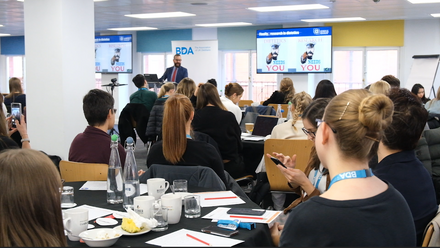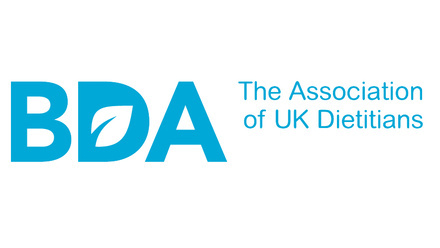As Professor Simon Langley-Evans says a fond farewell as Editor, we extend a huge thank you from everyone at the BDA and chat to him about the Journal’s successes, important milestones and why it’s so vital.
Professor Simon Langley-Evans is the longest serving Editor of the Journal of Human Nutrition and Dietetics, having been appointed back in 2012. As the first man in the role and the first non-dietitian, Simon took on the challenge and innovated and developed the offering to make research more accessible for all.
Simon steps down at the end of 2023, making way for a new Editor, Lauren Ball, who we’ll hear more from soon.
So Simon, what made you take on the role in the first place?
Prior to the Journal I’d had a number of editorial board roles for other publications and I saw doing those things as a normal part of my academic role. I had been an editorial board member for the British Journal of Nutrition and Experimental Physiology and Associate Editor for the International Journal of Obesity. When this role became available, I was looking to make a bigger contribution to the academic publishing community and I felt the Journal was in a bit of a rut and not achieving its full potential, so it seemed like a great opportunity for me to take on the challenge.
What have you enjoyed about the role?
I have relished the contacts with the broader international community and particularly enjoyed forming new relationships with our colleagues in Australia and North America. It has been a real privilege to see the Journal grow from receiving less than 250 manuscript submissions a year to almost 900 today, indicating a massive increase in interest.
I think I’m most proud that the reputation of the Journal has increased over my tenure as Editor though. We publish more work and we reach more readers than ever before. Last year our papers were downloaded more than 438,000 times, across 180 countries. The reach of our output is amazing and shows how we’ve achieved our aim to become a truly international publication.
Are there any memorable/ stand out articles or pieces of research that you want to highlight?
We have published hundreds of papers since I became Editor and it is really difficult to pick out highlights from such a great library of incredible research work.
I feel most proud of the things that we have published that have gone on to really influence the way in which dietitians practice, which have included a number of BDA guidelines papers, such as the British Dietetic Association systematic review and evidence-based practice guidelines for the dietary management of irritable bowel syndrome in adults (2016 update), or the association’s evidence-based guidelines for the dietary management of Crohn's disease in adults.
We were also very proud to publish a big body of work on low FODMAP diets and a number of articles about my own passions- diet in pregnancy and infant feeding.
There have been many innovative changes over the years, why have these been so important?
When I first took over as Editor, the Journal was still published as a printed hardcopy which was distributed to all members of the BDA. Since then, we’ve seen the introduction of online-only publishing and the growth of open access (which makes articles freely available to readers all over the world). This has been tremendously important as research can only be useful in changing clinical practice if dietitians can get to read it in a timely manner.
These days a piece of research can be accepted by us and available to read in a matter of weeks without the need to visit a library, whereas ten years ago it was a more cumbersome and less accessible process. As BDA members can access the Journal through an app, access to cutting-edge research is easier than ever.
We make active use of social media as a way of disseminating research findings and making work more accessible to a lay audience. We’ve introduced visual abstracts too, so that readers can see a simple infographic before jumping into the more detailed science.
We rebranded our website to make it more attractive and have provided links to audio and video presentations from authors to give another way for readers- both clinical and non-clinical, to access research. These little changes make an academic publication less stuffy and I think that this helps people who are outside of the academic world and our student readers.
Why would you encourage people to write for the Journal?
Writing for the Journal is a great developmental experience. Whilst many people find it hard to write a scientific paper at first, there is a lot of guidance available out there and once you get started it gets a lot easier.
Across my career, writing has become my passion as it provides the route through which I can report the research that I’ve done, describe the trials and experiments, explore new ideas and communicate how my findings have added to the existing knowledge in an area of nutrition and dietetics. If none of us write then our science will never advance as the journals are the way in which we pass on our work to other researchers and to clinicians.
And finally, on behalf of our student members, why are journals in general such critical resources and why should we be reading them?
Reading papers isn’t a favourite activity for many students but is a really important part of training. Whilst papers are written in a formal and often dense style, taking the time to understand them helps students to question the validity of assumptions made about the links between diet and health, the efficacy of clinical interventions, or the way in which responses to nutrition might vary between different population groups.
These things are the underpinning evidence for clinical practice, so when students graduate and start to work with patients, it is the research which leads what they do and which will provide the innovations for the future.
Everyone should try and read relevant research in their area of specialism on a regular basis, whether in the first year of practice, or when on the verge of retirement like myself. Students ought to familiarise themselves with which journals are reputable and useful to read and learn how to critique the papers and distinguish between high quality evidence and the downright nonsense about diet, nutrition and health which litters the internet and social media.
The Journal of Human Nutrition and Dietetics plays a critical role in the training of students and provides a discipline-specific route for our dietetic colleagues in academic or industry roles to share what they do.
With thanks to Simon from all at the BDA.
CEO Liz Stockley said, “The Journal has grown in both readership and reputation under Simon’s tenure as Editor in Chief. It is now the go-to publication for research relevant to the profession but also a source of inspiration for those looking to initiate or expand their research career. Thank you, Simon for your hard work in this space and for the impact you have had.”







